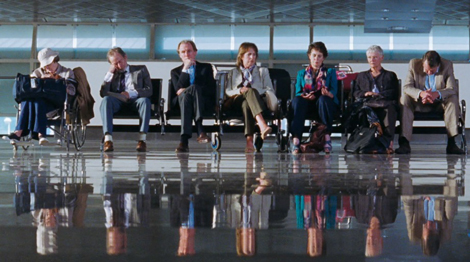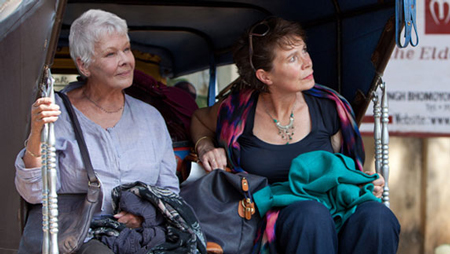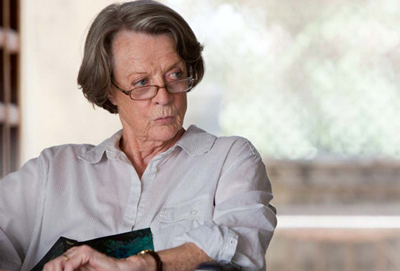
 |
|
|
|
The movie calendar now makes room once or twice a year for a prestigious film made about and for "older people" -- you know, those near or post- retirement age citizens that our society elbows aside, except when someone wants their money or their votes. The movies may be fun, as with 2003's cute Calendar Girls. Or the subject might study the serious side of aging, as with Judi Dench in Iris and Julie Christie in Away from Her, both of which examine dementia and Alzheimer's. All three of these examples draw upon the great wealth of -- what else can we call it? -- ageing acting talent. A literal Grand Hotel for the subgenre is this year's The Best Exotic Marigold Hotel, which transports seven Britishers on a retirement adventure to Jaipur, India. Ol Parker's adaptation of a book by Deborah Moggach has warmth, some good laughs and a feeling of respect for its characters, which alone is enough to recommend it. It also generates a comfortable feeling as we see several acting favorites struggle and adapt to a new lifestyle. Possibly green-lit by the success of 2008's Slumdog Millionaire, the colorful Best Exotic borrows that film's young star Dev Patel. 
A number of Londoners respond to an attractive ad for an economical retirement hotel in Jaipur, the Marigold. Widow Evelyn Greenslade (Judi Dench) must sell her house to cover her husband's debts, and chooses to take the leap in a new country instead of fall back on the charity of her children. Disillusioned and bitter about his life's work as a judge, Graham Dashwood (Tom Wilkinson) doesn't wait for retirement, but quits and opts for the Marigold's package transport to India. He spent his childhood there and hasn't been back for forty years. Douglas and Jean Ainslie (Bill Nighy & Penelope Wilton) have lost most of their savings investing in their daughters' business. The forever outraged and offended Jean rejects the tiny retirement condo they can afford, and allows herself to be talked into relocating to India against her better judgment. Marge Hardcastle (Celia Imrie) is tired of babysitting for her offspring and wants to find romance again, while she still can. The over-aged skirt-chaser Norman Cousins (Ronald Pickup) is just plain lonely and hopes that a new hunting ground will yield better results. The seventh voyager Muriel Donnelly (Maggie Smith) is a bitter unemployed domestic who makes the trip because it's the only way she can get hip replacement surgery without waiting half a year. Once in Jaipur, they discover that hotel owner Sonny Kapoor is close to bankruptcy and that he photo-shopped his hotel to look "like the vision he wants it to be." The guests adjust to rooms missing doors and plumbing that needs fixing, but most are intrigued by the city. Evelyn must find work, and stumbles into an interesting job advising telephone solicitors how to better connect with English customers. Graham experiences a refreshing return to his past, and begins a frustrating search to answer an old personal question. Marge joins an expensive country club in search of a rich retiree, only to find that the place is overrun with people in the same financial-marital state she is. Norman finds that his attempts to be suave with the ladies don't get him very far. Muriel has an unreasonable fear and hatred of Indians, and must learn to see them as deserving people with the same kinds of problems she has. Finally, Douglas embraces India and is enchanted by all he sees on day trips, while the obstinate Jean stays in the Hotel and festers in her negativity. She's soon suspicious that Douglas is keen on Evelyn, even though she herself is attracted to Graham. The guests aren't immediately aware of how shaky their tenure is at the Marigold. Sonny is in a double bind. His domineering mother (Lillete Dubey) thinks he's incompetent and takes steps to close the place down. Sonny hasn't the courage to oppose her, and also lacks the nerve to commit to his girlfriend Sunaina (Tena Desae). The Best Exotic Marigold Hotel achieves what all ensembles are after, a feeling of connectedness among its individual stories. Good acting and the relaxed direction of John Madden helps, but a main interest of the film is how it handles class-economic considerations. More than half of the voyagers have gone to India in search of an affordable lifestyle, but the show doesn't slam England for making life tough for its vanishing middle class. It also doesn't register any local backlash against the Brits for arriving to take advantage of an economy where their shrinking Pounds Sterling can still buy a retirement above the penury level. Evelyn needs a job and is fortunate to find one as a consultant. Folk unhappy with the modern onslaught of telephone solicitation may not like what she's doing, but it's certainly the name of the game in India. Muriel finally sees her anti-Indian prejudice for what it as, after accepting the hospitality of a serving-woman whose plight is much the same as her own. Muriel spent her whole life raising two generations of a family's children, only to be turned out by her employees. Her new Indian friend lives with a large family in abject poverty, because the injustice of the caste system is still in (unofficial) effect. 
The movie is about finding the courage to adapt to The New, as the only real choice for retirees that want to go on living meaningful lives. None of our people are truly trapped by economic or health problems, and all are at liberty to run off and start new lives if they want to. But it's not like the movie cheats -- join a group of people on a cruise, and by and large you'll find that the one thing they have in common is that they can afford the price of a ticket. Evelyn has never been independent; she cautiously discovers that she can take care of herself. Away from his work the runaway judge Graham turns into a different personality, and seems to be in search of a kind of closure for his life. Marge and Norman are after romance and companionship, so they're already motivated to take risks. Norman begins as a borderline dirty old man, but once he starts telling the plain truth about himself, his luck changes. Taking the dissenting side is Penelope Wilton's Jean Ainslie, who seems unable to cope with her loss of station back in England. She complains and rails against everything she sees and hears, avoids the food and harps endlessly at her husband about how terrible their circumstances have become. Jean is incapable of adjusting to anything. She keeps reaching out to the judge, expecting his respectability and status to save her. She's too pathetic to despise. The "Indian" side of the story is less insightful but played with charm by Dev Patel and Tena Desae. Sonny is a skittish fast-talker who answers concrete inquiries from his guests by waxing poetic about his ambitious fantasies. He's greatly in need of an organizer. Sunaina is a thoroughly modern girl willing to dodge out from under her brother's eye to sleep with Sonny. She's frustrated that he wants to pursue his vague dreams before he settles down with her. The acting overall is thoroughly professional and fresh; people like Judi Dench and Celia Imrie are simply pleasant to spend time with no matter what their roles. Maggie Smith has a nice change of pace as a retired working woman congealed into a ball of bad attitudes. I seem to have caught Bill Nighy playing too many eccentrics, reading dialogue that's far too clever to be real. His Douglas is at a loss for words in most situations. He's swept away by the new environment and inspired to do things he never thought he'd attempt, like fix a leaky faucet: the Hotel Marigold is a place where the guests have to serve themselves. Tom Wilkinson gives another almost effortless performance. He and Jim Broadbent seem to have had the best gray-hair roles sewn up for the last fifteen years. Graham's big personal mystery is the only melodramatic turn in the multi-story The Best Exotic Marigold Hotel, and director John Madden doesn't push it -- no tense flashbacks to 1970s India. Director Madden has given The Best Exotic Marigold Hotel a nice sense of Jaipur without piling on the exoticism - for that, see Wes Anderson's The Darjeerling Limited. India is a country packed with people where a full range of human experience can be found. It avoids standard travelogue scenes. The newcomers instead return to the hotel and talk about their discoveries. Exteriors are filmed with a slight overexposure that makes oranges and yellows burn out somewhat, a technique used to express the 'heat and dust' in older Merchant-Ivory films like, uh, Heat and Dust. The traffic is horrendous but it's something that the residents must take in stride. When they wander back to the hotel after a day's touring/work, they feel like they're actually living real lives. 
The Best Exotic Marigold Hotel has its commercial considerations -- it's got plenty of humor and the cross-section of retirees are probably twice as interesting as the norm. It generates a warm feeling about people and their hopes for a change for the better, and it doesn't insult our intelligence doing it. It's highly recommended. Fox's Blu-ray of The Best Exotic Marigold Hotel is a fine encoding of this widescreen feature shot in Super-35 on Fuji film stock (which also contributes to the saturated primary colors). It's attractive at all times. Thomas Newman's score sounds fine on the clear sound tracks, although for the sake of additional clarity I used the English sub option when viewing. Four featurettes constitute the extras: a making-of, a celebration of the exceptional cast, a piece on the Indian locations and one on the "Tuk Tuk" motor carts that whisk travelers through the crowded Jaipur streets. Fox's menus and overall presentation matches the film's relaxed, pleasant attitude.
On a scale of Excellent, Good, Fair, and Poor,
The Best Exotic Marigold Hotel Blu-ray rates:
Reviews on the Savant main site have additional credits information and are often updated and annotated with reader input and graphics. Also, don't forget the 2011 Savant Wish List. T'was Ever Thus.
Review Staff | About DVD Talk | Newsletter Subscribe | Join DVD Talk Forum |
| ||||||||||||||||||